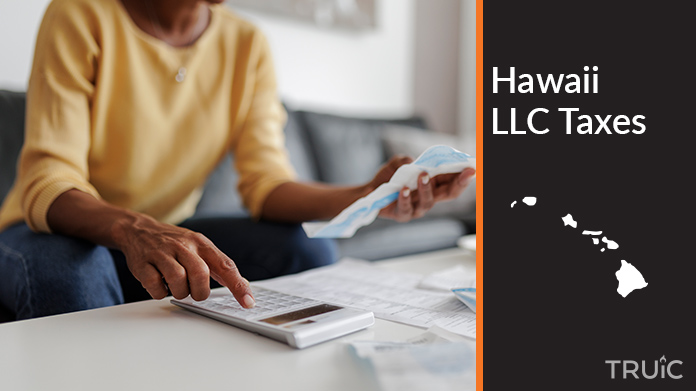Hawaii LLC Taxes
Hawaii’s sunny beaches and tropical climate attract many people each year — with some trying to start their own businesses on the islands. But, creating a business can prove challenging as you navigate the state’s taxes and regulations.
Regardless of the size of your business, if you operate a limited liability company (LLC) in Hawaii, you’ll need to ensure you stay up to date on your finances and pay federal, state, and local taxes. Our guide will help you understand which taxes you’ll need to pay for your Hawaii LLC.
Recommended: Schedule a free consultation with an accountant to stay on top of your taxes.

Hawaii LLC Taxes Owed
As in other states, LLCs in Hawaii benefit from pass-through taxation in which the business’s profits pass through to its members’ individual tax returns. This means the LLC isn’t responsible for paying any taxes to the state or federal government. Instead, LLC owners must pay taxes on their portion of the income the LLC made.
In Hawaii, LLC owners can expect to pay the following taxes:
Federal Taxes
Regardless of where your business is located, if you have an LLC within the United States, you will have to pay federal income taxes and federal self-employment taxes. These taxes are reported on your Form 1040.
Federal Self-Employment Taxes
It doesn’t matter if your LLC is a single-member LLC or a multi-member LLC; all LLC members must pay self-employment taxes on their share of the LLC’s profits. The self-employment tax rate is 15.3%.
Federal Income Taxes
Your federal income taxes will depend on your tax bracket, and the cutoffs for individual tax brackets, as well as the percent owed, will change each year.
Hawaii State Taxes
Each state has its own laws dictating how it taxes individuals and businesses. For example, Hawaii doesn’t have a sales tax and instead imposes a general excise tax. Below are important taxes you’ll need to know about when operating an LLC in Hawaii.
Hawaii Income Taxes
One concern you may have when starting an LLC in Hawaii is the state’s high income tax. At 11%, Hawaii’s income tax rate is the second-highest in the country. This may prove burdensome for certain businesses so it’s something to keep in mind.
Hawaii General Excise Tax
Hawaii levies a general excise tax (GET) instead of a state sales tax. The primary difference is that businesses collect sales taxes from customers while the state collects a GET from businesses. While no business has to apply the GET to their products or services, most do. The average GET rate in Hawaii is 4% with some local areas increasing it to 4.5%.
The Hawaii Department of Taxation provides a GET FAQ on its website as well as a Tax Facts 37-1 document, which offers a simple overview of this tax.
Register for a GET License
All Hawaii businesses are subject to GET and must obtain a license in order to operate within the state. Visit the Hawaii Department of Taxation website for more information about the GET and the forms to register for a GET License.
Additional State Taxes
The Hawaii Department of Taxation oversees the collection of various state-specific taxes that businesses may have to pay, depending on their location, industry, and number of employees. Here are a few examples of these additional taxes:
- Cigarette and Tobacco Tax
- Fuel Tax
- Rental Motor Vehicle, Tour Vehicle, and Car-Sharing Vehicle Surcharge Tax
- Transient Accommodations Tax
You can find more information about these business taxes on the Hawaii Department of Taxation website.
Hawaii Local Taxes
Laws and regulations placed on LLCs differ from one Hawaiian island to another. Regardless of your LLC’s location within the state, we recommend you check with your local jurisdiction to ensure your business obtains the proper local permits and follows any local regulations that may impact its operations.
Hawaii LLC Compliance
You must obey Hawaii’s state and local laws in order to maintain your business in good standing. While LLCs technically don’t file taxes with the state, Hawaii businesses must still file an annual report each year.
Hawaii LLC Annual Report
To keep your business compliant with Hawaii’s laws and regulations, you must file an annual report with the Hawaii Business Registration Division each year. You can do this by mail or online, and the filing fee is $15.
The state of Hawaii can charge up to $100 for a late report so make sure you pay on time. The due date for this report will depend on the quarter in which you formed your LLC. For example:
- If you formed your LLC in Q1 (Jan. 1-March 31), your annual report is due by March 31.
- If you formed your LLC in Q2 (April 1-June 30), your annual report is due by June 30.
- If you formed your LLC in Q3 (July 1-Sept. 30), your annual report is due by Sept. 30.
- If you formed your LLC in Q4 (Oct. 1-Dec. 31), your annual report is due by Dec. 31.
For more information, check out our Hawaii LLC Annual Report guide.
LLC taxes are complex. While our guide can provide you with important information, we recommend you schedule a free consultation with an accountant to ensure you handle your business taxes correctly.